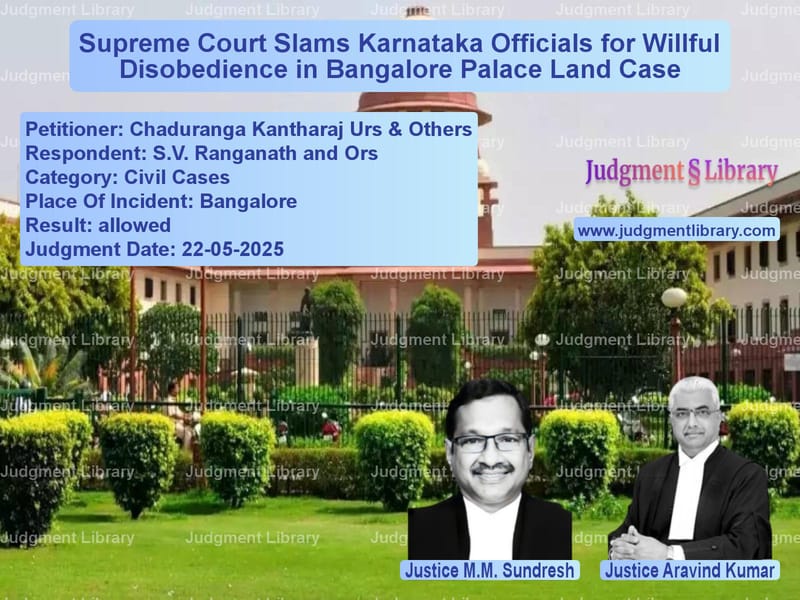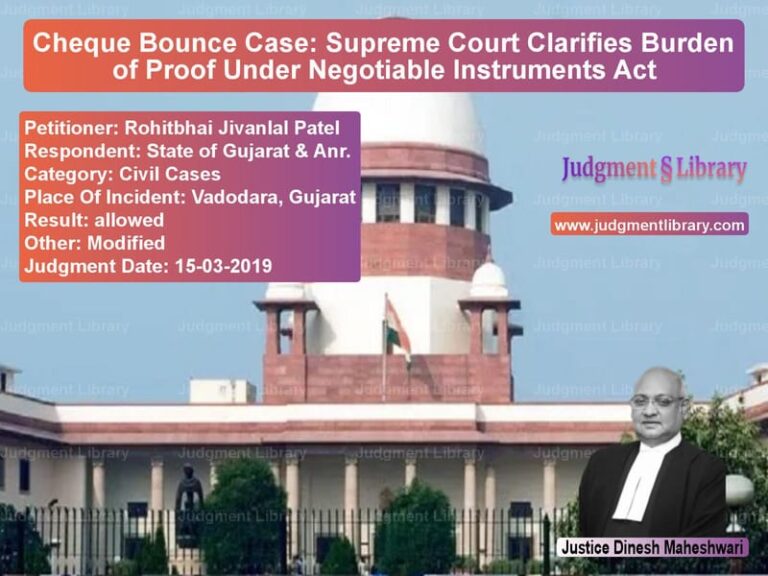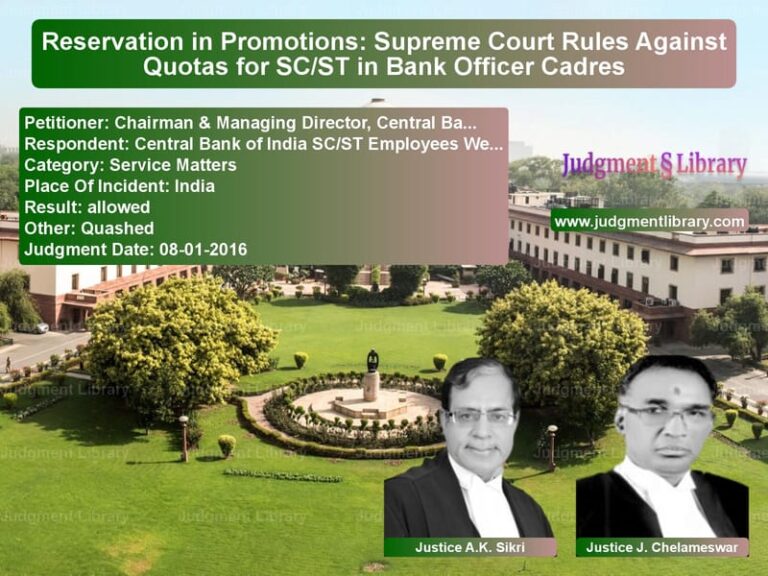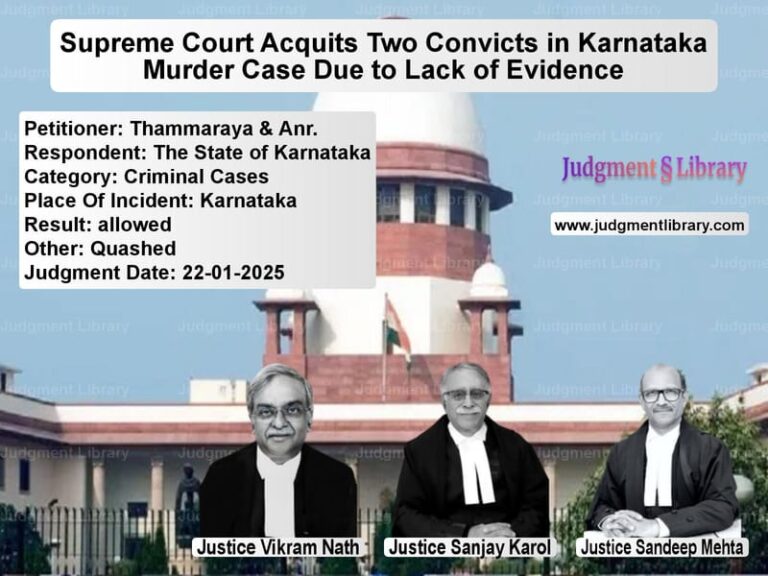Supreme Court Slams Karnataka Officials for Willful Disobedience in Bangalore Palace Land Case
In a strong indictment of government officials dragging their feet for over a decade, the Supreme Court has come down heavily on Karnataka state authorities for willful disobedience of court orders in the long-pending Bangalore Palace land acquisition case. The judgment delivered on May 22, 2025, brings to a close multiple contempt petitions that exposed systematic attempts by officials to avoid implementing court directives regarding Transferable Development Rights (TDRs) to landowners.
The case has its origins in the acquisition of approximately 472 acres of land under the Bangalore Palace (Acquisition and Transfer) Act, 1996. What followed was nearly three decades of legal battles between the original landowners and the state government over compensation and development rights. The current contempt petitions were filed alleging willful disobedience of Supreme Court orders dated November 21, 2014, May 17, 2022, and March 19, 2024.
A History of Deliberate Non-Compliance
The Supreme Court bench comprising Justice M.M. Sundresh and Justice Aravind Kumar expressed strong disapproval of the state officials’ conduct, noting that despite clear directions, the contemnors had “dragged their feet for long number of years i.e., more than 10 years.” The Court observed that the officials had been held guilty of willful non-compliance in its earlier judgment dated December 10, 2024, and had even been imposed costs of ₹1,00,000 to each of the complainants.
Despite this, the Court noted with concern that “undaunted, the contemnors seem to be further dragging their feet by manoeuvres and same is deprecated. We say so, for the simple reason that contemnors under the umbrella of the legislation orders of the Court which ought to be implemented in letter and spirit is sought to be stifled or stayed off which cannot be countenanced at any rate.”
The Court’s frustration was palpable as it recounted how the state officials had made multiple attempts to avoid compliance, including depositing Development Rights Certificates (DRCs) and TDRs in incorrect names and filing fresh applications seeking to delay the implementation of court orders.
The Final Opportunity and Continued Defiance
In its December 2024 judgment, the Supreme Court had taken note of purported compliance affidavits where the DRCs/TDRs had been resolved to be issued by adopting the value as determined under the BPAT Act. However, the Court had rejected this approach and issued clear directions to re-issue the certificates properly.
The Court had then extended an “olive branch” to the contemnors to purge themselves of contempt, granting them six weeks to comply with the orders. The Court had made it clear that failure to comply would require the Commissioner of BBMP and the Competent Authority for issuance of TDR to appear in person before the Court.
Despite this final opportunity, the officials continued their resistance. The Court noted that “the State and its officials having used all its might to stifle the orders dated 21.11.2014 and 17.05.2022, passed by this Court and having made a show of having complied with the order by depositing the incorrect and improper DRC’s / TDR’s, which was not in due compliance of orders of this Court.”
The Legal Arguments and Court’s Rejection
Senior Counsel Shri Kapil Sibal, appearing for the contemnors, made several arguments attempting to justify the non-compliance. He contended that “complainant (i.e., contempt petitioners) would not be eligible or entitled to receive the DRC’s/ TDR’s” and alternatively argued that even if the Court found them eligible, “the complainants should not be permitted to withdraw the same till disposal of Civil Appeals as well as review petitions.”
The Court firmly rejected these arguments, stating: “However, we are unable to accept the said contention for the simple reason and by noting at the cost of repetition, this court is sitting in a limited jurisdiction viz., to examine as to whether order passed by this Court on 10.12.2024 has been complied or not and we would not act as an appellate court and re-examine the correctness or otherwise of the orders passed by this Court. Those aspects would be outside the scope of these proceedings and submission to the contrary cannot be entertained.”
The Court also dismissed Sibal’s apprehension that if the complainants didn’t succeed in the civil appeals, the state exchequer wouldn’t be able to recover the value of DRCs/TDRs. The Court noted that this was “not a genuine apprehension” and that imposing conditions now “would amount to tweaking the orders dated 21.11.2014, 17.05.2022 and 10.12.2024.”
The Court’s Firm Stance on Implementation
The Supreme Court emphasized the limited scope of contempt proceedings, stating that “scrutiny or examination of any other issue would only be alien to these proceedings.” The Court made it clear that it would not allow the contemnors to use these proceedings to re-litigate issues that had already been decided.
In a significant observation, the Court stated: “We notice at the cost of repetition that any further condition if being imposed in these proceedings it would amount to tinkering or altering or reviewing or modifying the orders dated 21.11.2014 and 17.05.2022.”
The Court took note of the fact that the complainants had already furnished undertakings as required by notices issued by the Deputy Commissioner, BBMP on December 31, 2024, and January 15, 2025. However, to allay the state’s apprehensions completely, the Court directed the complainants to file additional undertakings before the Court.
The Balanced Solution
While firmly insisting on compliance with its orders, the Supreme Court also provided a balanced solution to address the state’s concerns. The Court directed that “complainants to file an undertaking before this Court by way of an affidavit in these proceedings to the effect that receipt of DRC’s / TDR’s would be subject to outcome of pending civil appeals.”
Additionally, the Court made it clear that “in the event of contemnors not succeeding in the pending civil appeals and any compensation being awarded in those proceedings, if any, in favour of the complainants, the State shall have the first charge or claim over such compensation so determined or awarded that may be payable by the State to the complainants.”
The Court noted that with these safeguards, “the apprehension of Mr. Kapil Sibal, learned Senior Counsel appearing for contemnors stands allayed.”
Technical Corrections and Final Directions
The Court also addressed technical issues in the implementation, particularly noting that in Contempt Petition No. 103 of 2025, the TDRs/DRCs had been deposited in the name of “Shrimati Indrakashi Tripurawasni” instead of the correct name “Shrimati Indrakshi Devi.” The Court ordered this correction to be made within four weeks.
The final directions were clear and unequivocal: “The TDR’s / DRC’s already deposited by the State is ordered to be handed over to the respective complainants or their authorized representative by the Registry forthwith on such affidavits of undertaking as ordered hereinabove being filed.”
The Court also directed that the costs of ₹1,00,000 per complainant, which had been deposited, should be paid to the respective complainants as ordered in the December 2024 judgment.
Broader Implications
This judgment serves as a strong reminder to government officials about the binding nature of court orders and the consequences of willful disobedience. The Supreme Court’s firm stance demonstrates that procedural maneuvers and technical objections cannot be used to avoid implementing clear judicial directives.
The case also highlights the challenges faced by citizens in dealing with bureaucratic resistance to court orders, even when those orders have been repeatedly affirmed by the highest court of the land. The fact that it took over ten years and multiple contempt proceedings to secure compliance with relatively straightforward orders speaks volumes about the need for greater accountability in government functioning.
The Supreme Court’s approach in this case—being firm on compliance while providing reasonable safeguards to address legitimate concerns—sets an important precedent for balancing the interests of justice with practical considerations. The solution of requiring undertakings from the beneficiaries while preserving the state’s claims in pending appeals represents a pragmatic approach to resolving complex implementation issues.
As the Court finally disposed of the multiple contempt petitions that had spanned years, it sent a clear message that the authority of the judiciary cannot be undermined through strategic delays and procedural obstructions. The judgment reinforces the principle that once the highest court has spoken, compliance must be prompt and complete, regardless of any pending parallel proceedings.
Petitioner Name: Chaduranga Kantharaj Urs & Others.Respondent Name: S.V. Ranganath and Ors.Judgment By: Justice M.M. Sundresh, Justice Aravind Kumar.Place Of Incident: Bangalore.Judgment Date: 22-05-2025.Result: allowed.
Don’t miss out on the full details! Download the complete judgment in PDF format below and gain valuable insights instantly!
Download Judgment: chaduranga-kantharaj-vs-s.v.-ranganath-and-o-supreme-court-of-india-judgment-dated-22-05-2025.pdf
Directly Download Judgment: Directly download this Judgment
See all petitions in Contempt Of Court cases
See all petitions in Property Disputes
See all petitions in Judgment by M.M. Sundresh
See all petitions in Judgment by Aravind Kumar
See all petitions in allowed
See all petitions in supreme court of India judgments May 2025
See all petitions in 2025 judgments
See all posts in Civil Cases Category
See all allowed petitions in Civil Cases Category
See all Dismissed petitions in Civil Cases Category
See all partially allowed petitions in Civil Cases Category







